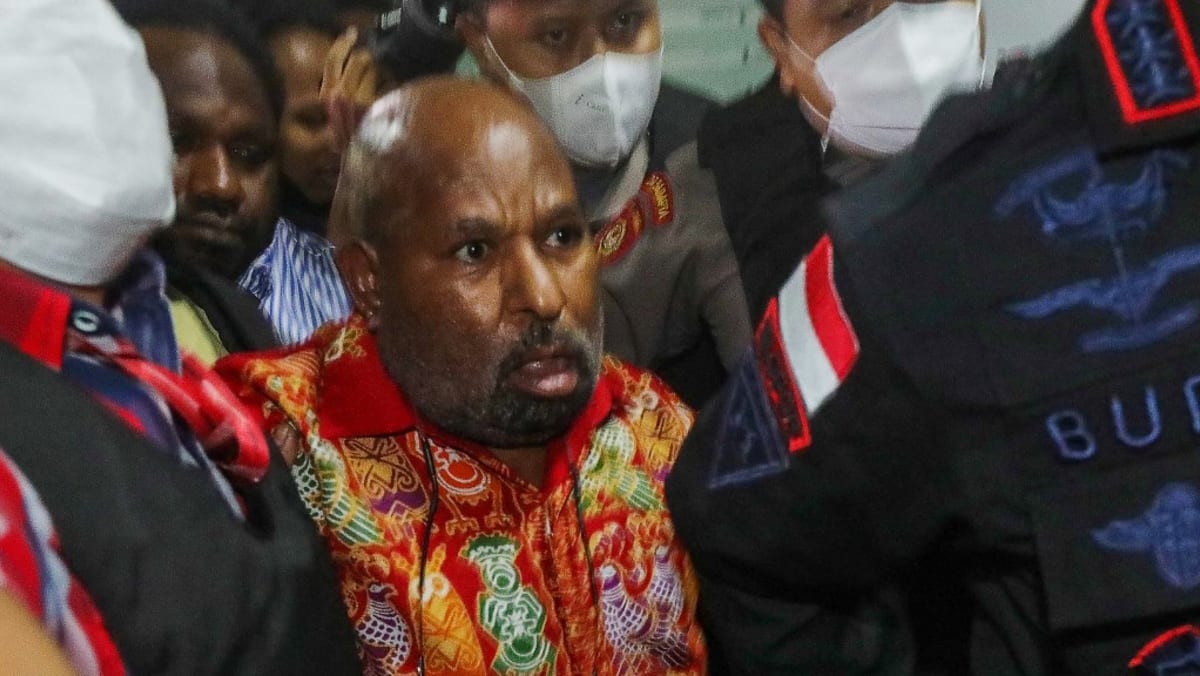
JAKARTA/SINGAPORE: The death of former Papua governor Lukas Enembe while serving time for graft has sparked criticisms against the beleaguered Corruption Eradication Commission (KPK) for worsening the man’s health by subjecting him to court trials.
The KPK, however, said that while all charges against Lukas have been dropped owing to his death, the commission reserves the authority to recover all the state financial losses in relation to the former governor’s case.
An expert told CNA that the authorities may recover its assets through various ways, chief among them is to make its claims against Lukas’ estate.
Lukas died on Tuesday (Dec 26) while receiving treatment for kidney failure at Gatot Subroto Army Hospital, the Jakarta Globe reported.
His body will be flown back to Papua early on Thursday amid tightened security measures.
Local media reported that Lukas’ health deteriorated over the last several months even as he was undergoing a series of trials in relation to his corruption case.
Lukas was convicted of bribery and graft worth tens of billions of rupiah related to some infrastructure projects in Papua.
Authorities were also looking into a possible money laundering case against Lukas but local media reported that KPK prosecutors had not yet handed over the case to the court.
In October, Lukas was sentenced to eight years in prison, a fine of 500 million rupiah and ordered to pay 19.8 billion rupiah in state compensation. He would have had to serve an extra four months in jail if he failed to pay the fine and an extra two years if he failed to cough up the sum for the state compensation.
Just earlier this month, the Jakarta High Court rejected his appeal and increased his sentence to 10 years in prison, his fine to 1 billion rupiah and more than doubled the state restitution to over 47 billion rupiah.
Lukas was required to pay the restitution within one month. Otherwise, his property would be confiscated and if the value is insufficient, his prison sentence would be extended for an extra five years.
CLAIMS BY LAWYER
Mr Petrus Bala Pattyona, who was Lukas’ lawyer, told local media that the KPK should be held responsible for his client’s death. He claimed that by Indonesia’s law, those who are sick should not be tried in court.
“Of course, he was sick. According to the law, sick people cannot be tried,” he was quoted as saying by Tempo.
Mr Petrus further added that Lukas’ death meant that legal action could no longer be taken against his client.
“The decision that was to be implemented automatically expires because of the defendant’s death,” he said.
The anti-corruption agency itself has been plagued with scandal after its chairman Firli Bahuri was named as a suspect for alleged extortion against a former agriculture minister.
The embattled Firli, who had previously called out Lukas for the latter’s alleged corrupt behaviour and financial extravagance, has since resigned from his post on Dec 21.
The KPK deputy chairman Johanis Tanak maintained on Wednesday that the state can still file a prosecution in the form of compensation from suspects and defendants who have died through their estates.
“The state still has the right to demand compensation for state finances through a civil legal process by filing a civil lawsuit to the district court,” Mr Johanis was quoted as saying by Kompas.
CNA has contacted the KPK for comments.
Law expert Gandjar Laksmana Bonaprapta from the University of Indonesia told CNA that under Indonesian law, a case can no longer be investigated “with the loss of the right to prosecute, for example due to the death of a suspect”.
“If the case is inkracht (can no longer be appealed) and it is ordered that the payment of state financial losses must be paid by the suspect, then under Indonesian law it is possible to demand the payment of state financial losses from the suspect’s estate.
“Officials can also take the state financial losses from the suspect’s confiscated assets. However, if the amount of assets seized is insufficient to pay the state financial recovery, then the authorities can demand the estate to pay it through the civil court,” said Mr Gandjar.
Meanwhile, criminal law expert Abdul Fickar Hadjar from Trisakti University agreed that civil claims can be made against the Lukas’ estate.
“However, the state must be able to prove that the property controlled by the deceased’s family is state property,“ said Mr Fickar.
TIGHTENED SECURITY MEASURES IN PAPUA
Ahead of Lukas’ burial in Papua, the state police chief Mathius D Fakhiri asked the people of Papua to accept his death, according to Tempo.
Mr Mathius added that the police will provide maximum security upon the arrival of Lukas’ body in Papua, especially at Sentani International Airport in Jayapura.
During the mourning period, Mr Mathius said that the police would carry out security measures while respecting the Papuan culture and beliefs regarding funeral processions.
Lukas was serving his second term as Papua governor when he was arrested by the authorities earlier in January. He was first elected as governor in 2013 during the tenure of President Susilo Bambang Yudhoyono, who is the founder of the Democrat Party.
Lukas’ arrest was met with protests from his supporters – one person died after being shot by the police while three others were injured.
The police headquarters in Papua was also attacked by a mob of his supporters.
His case highlighted the lavish lifestyle of the governor even as resource-rich Papua was widely known as Indonesia’s poorest province.
Despite the corruption case that ensnared him, many praised Lukas for the progress of Papua, one of which was the success of holding the National Sports Week and National Paralympic Sports Week in 2021.
An anti-corruption activist in Papua whom CNA spoke to said that Lukas had been known to “pay close attention to (the needs of) indigenous Papuans”.
The activist, who did not want to be identified, added that many Papuans consider gratuities given out to be a common practice even though “it is a form of corruption”.
“This is due to Papuans’ lack of understanding about corruption, so they consider what Lukas did to be normal,” the activist said.
On the reception of the Papuan people ahead of Lukas’ burial, the activist said that the authorities “have gathered at the points where the Highland Papuan tribe lives”.
“Thank God, the pastor at the church where Lukas Enembe worships has appealed to the community not to vandalise anything. He said, ‘this Christmas should be enjoyed with a sense of peace, so that whatever happens must be accepted peacefully’,” said the activist.
Separately, the Papua provincial government has also asked residents and offices in the state to fly the flag at half-mast for three days. This was done in memory of the former governor who died.

